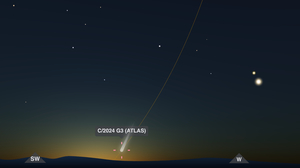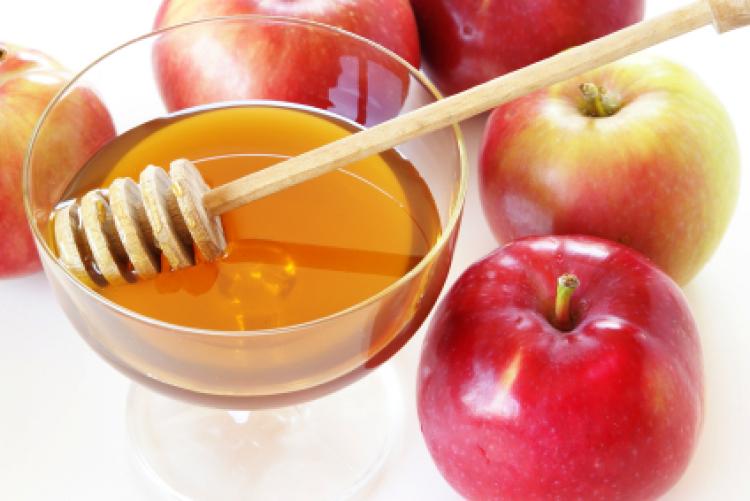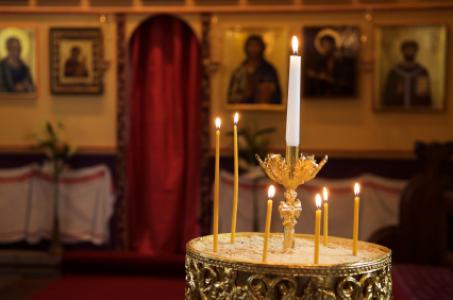
Best Comet of 2025?
C/2024 G3 (ATLAS) has already become very faintly visible to the naked eye for observers in the Southern Hemisphere.
Rosh Hashanah, or Rosh Hashana, is the Jewish New Year celebration. In the UK, it lasts for two days.

Apples and honey are eaten during Rosh Hashanah.
©iStockphoto.com/Elżbieta Sękowska
Rosh Hashanah occurs on the first day of Tishrei, the seventh month of the Jewish calendar. The date falls in September or October in the Gregorian calendar.
While the holiday lasts for one day in Israel, Jewish people in other countries, including the United Kingdom, usually observe it for two days.
Rosh Hashanah, while being an important occasion for Jewish people, is not a public holiday in the UK. However, Jewish organizations may be closed or have restricted opening hours.
In the Gregorian calendar, a new year always begins on January 1, the first day of the first calendar month. However, Rosh Hashanah occurs at the beginning of Tishrei, the seventh month in the Jewish calendar.
The reason for this odd placement is that Rosh Hashanah, while being considered the beginning of the civil year, is not the only Jewish New Year celebration. For example, the religious year begins in Nisan, the first month of the Jewish calendar year.
In fact, Jewish time reckoning recognizes four different New Years, each having a different purpose:
Rosh Hashanah is considered an occasion when God reviews and judges a person's deeds in the past year. It is also a time to look ahead with hope and to pray for personal growth and for reflection.
Many Jewish families gather for a special meal to celebrate Rosh Hashanah, which commences at nightfall the day before Tishrei 1. Celebrations begin after the evening prayer where family and friends join in to reflect on the past and make a fresh start for the New Year.
In the morning, the shofar is blown in synagogues all around the UK, except if the celebration falls on a Shabbat. This ancient wind instrument, traditionally made of a ram's horn, is played like a trumpet and has great religious significance in Judaism. At least 100 shofar blasts are blown during the morning services.
Another activity that occurs during Rosh Hashana is performing the casting ritual (tashlikh), which involves reciting prayers near naturally flowing water and “throwing sins away” (for example, in the form of bread pieces).
According to the rules associated with the holiday, it is not permitted to work on Rosh Hashanah, so Jewish people in the UK may take some time off work.
Challah bread, pomegranates and apples dipped in honey, and carrot stew (tzimmes) are popular dishes during Rosh Hashana.
According to the Hebrew Bible, Rosh Hashanah marks the anniversary of the creation of Adam and Eve. It covers two of the 10 High Holy Days that conclude with Yom Kippur, the Day of Atonement.
The United Kingdom is estimated to have the 5th largest Jewish population in the world, with just under 300,000 people practicing the Jewish faith in the country. By far the largest British Jewish community is found in London, followed by those in Manchester and Leeds.
Jewish settlement in England can be traced as far back as the time of the Norman Conquest in 1066. The Jewish community outnumbered the Spanish and Portuguese communities in England by the 18th century.
Many Jewish families in Eastern Europe moved to England to escape persecution and hardship between 1881 and 1914. About 150,000 Jewish people settled in England, with large numbers staying at London's East End during that time. England continued to receive Jewish immigrants escaping persecution around the time of World War II (1939-1945).
In the Jewish diaspora—Jewish communities outside of Israel—an extra day is usually added to religious observances, with the exception of Yom Kippur, which lasts only one day worldwide, and Rosh Hashana, which is celebrated over two days in both Israel and the diaspora.
This custom has its roots in ancient times when the beginning of the months in the Jewish calendar still relied on the sighting of the crescent Moon following a New Moon.
The beginning of a new month was determined by the Sanhedrin, the supreme court of ancient Israel in Jerusalem. Once the date was published, messengers were dispatched to spread the news among Jews living abroad. Since this process took some time, it was decreed that Jews outside of ancient Israel were to observe every holiday for 2 days to make sure that the rules and customs applicable to each holiday were observed on the proper date. This rule is still observed today.
Note: Jewish holidays begin at sundown the day before the date specified for the holiday.
| Year | Weekday | Date | Name | Holiday Type |
|---|---|---|---|---|
| 2020 | 土曜日 | 9月19日 (土) | Rosh Hashana | Jewish Holiday |
| 2021 | 火曜日 | 9月7日 (火) | Rosh Hashana | Jewish Holiday |
| 2022 | 月曜日 | 9月26日 (月) | Rosh Hashana | Jewish Holiday |
| 2023 | 土曜日 | 9月16日 (土) | Rosh Hashana | Jewish Holiday |
| 2024 | 木曜日 | 10月3日 (木) | Rosh Hashana | Jewish Holiday |
| 2025 | 火曜日 | 9月23日 (火) | Rosh Hashana | Jewish Holiday |
| 2026 | 土曜日 | 9月12日 (土) | Rosh Hashana | Jewish Holiday |
| 2027 | 土曜日 | 10月2日 (土) | Rosh Hashana | Jewish Holiday |
| 2028 | 木曜日 | 9月21日 (木) | Rosh Hashana | Jewish Holiday |
| 2029 | 月曜日 | 9月10日 (月) | Rosh Hashana | Jewish Holiday |
| 2030 | 土曜日 | 9月28日 (土) | Rosh Hashana | Jewish Holiday |
While we diligently research and update our holiday dates, some of the information in the table above may be preliminary. If you find an error, please let us know.

C/2024 G3 (ATLAS) has already become very faintly visible to the naked eye for observers in the Southern Hemisphere.

Yom Kippur is arguably the holiest of the Jewish holidays. It is celebrated in October or November.

Orthodox Christians in the United Kingdom mark the start of a new calendar year on either January 1 or 14 in the Gregorian calendar.

Burns Night celebrates the life and work of Robert Burns and Scottish culture in general. It is on or around January 25 each year.